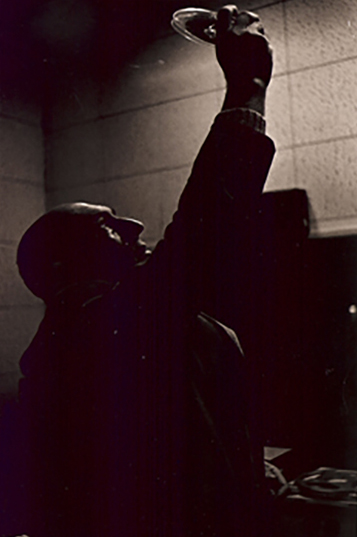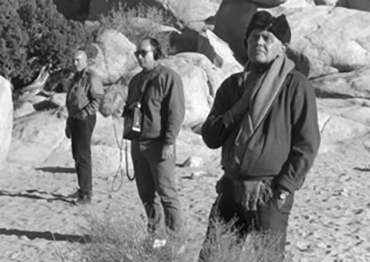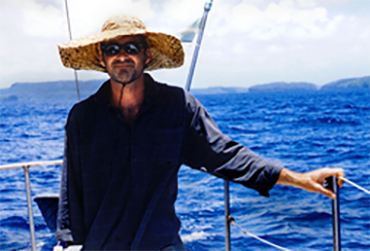Bay Area Radio Drama: Overview | Project Archive | Photos | Ensemble| Links

The BARD Archive: 50 years of audio excellence
By 1960 Pacifica radio station KPFA, in Berkeley, California, had become a unique visionary model and promise for cultural radio in America. It offered a wide range of programming in the arts, music, sciences, public affairs, and the humanities. The Drama and Literature Department was given generous broadcast time for world literature, current art movements and most important, the art of radio drama in all its variety. Programs drawn from BBC, Canada, Australia, were broadcast regularly, but in addition KPFA produced original drama and literature programming with talents drawn from it’s own community, or from, as they grew, other Pacifica network stations in Los Angeles and New York. It was an inspiring opportunity for those of us who had given up hope for such a rebirth of radio broadcasting in this country.
Drawn to the station in 1961, I proposed to do some readings for the Department, which at that time was directed by John Leonard. He put me in a studio with microphone and engineer and said “Go ahead” and I did a thirty minute segment from Sartre’s novel, Nausea! Months later with no forewarning, I found it listed in the KPFA Folio for an evening broadcast. Another reading, Dostoevsky’s Notes from the Underground followed, but these tapes remained unedited for several months. No one to edit them. I offered to learn how and John set me up. Everything later began in that tiny, airless, cluttered, but embryonic editing room.
Thus it was a privileged and rewarding opportunity. In 1963, in association with my colleague Kenneth Lash at the San Francisco Art Institute, I took over the Department. and we were able to extend the programming of the former directors first by moving from an alcove to a full-sized production office, with its own editing equipment and space for volunteers and things to happen.
Lash received a university post teaching English in the mid-west and I remained at KPFA looking forward to a career in radio. Most important to me was the production of new and original drama and other acoustical work by writers, performers and sound designers from wherever they could be found. There was an abundance of such volunteers and media artists in the community. In particular Randy Thom and Jim McKee came from the nearby outer world and have remained production colleagues throughout their years of ascending accomplishments and fame. Special projects were eventually funded from various sources outside of Pacifica. In particular we received the first funding award, for radio drama production from the National Endowment for the Arts. Thereafter, all funded projects brought payment to artists and participants. In 1987, Bay Area Radio Drama (BARD) my independent non-profit corporation, was formed. Its funding, from NEA, NEH and other sources, allowed some independence from KPFA during their years of political and programming turmoil that followed.
All BARD productions were first broadcast on KPFA, but those with outside funding were the property of BARD, and remain so. They went, as well, to other stations via National Public Radio and overseas to BBC, Australian Radio and Germany’s WDR Köln, with more recent distribution by Public Radio International. Through my elected presence at EBU (European Broadcasting Union) conferences, a way was set for many of the projects that followed, notably the Hörspiel/USA project with WDR Köln. as described in this Web site. Note that each of the various projects include many separate works, the projects themselves often overlapping other concurrent projects. The listings that follow, with their approximate dates of productions and distribution, tell the rest of the story.
We look forward to making the programs listed here and others to come, available for listening and further broadcast.
BARD Content:
Overview |. Archive. |. Photos |. Ensemble. |. Links

Bay Area Radio Drama
Bay Area Radio Drama (BARD) was established as a nonprofit organization in 1986. Its mission has been to keep alive and develop the art of radio, particularly radio drama, in this country. BARD worked in close association with KPFA-FM, in Berkeley, California, where Bauersfeld, was Director of Drama and Literature for 30 years. With funding from the National Endowment for the Arts and other national & international sources, BARD has produced many series of original radio dramas; works by such writers as Sam Shepard, Susan Griffin, André Codrescu, Ed Bullins, and others. BARD collaborated with Earwax Studios editing the sound production for KCRW’s 29-part dramatization of Sinclair Lewis’s Babbitt. With sound designer Randy Thom BARD produced the Eugene O’Neill Radio Series, commemorating the playwright’s centennial. Seven O’Neill plays under the direction of José Quintero, including Hughie, with Jason Robards and The Emperor Jones with Joe Morton. The final production was O’Neill’s Lazarus Laughed. This was the play’s first complete production and was produced in association with James McKee and Earwax Productions in San Francisco. The O’Neill plays were broadcast nationally and in London six plays were selected and broadcast by the BBC. In association with WDR Köln, Bard produced Hörspiel USA, a series of translated works representing a wide range of work produced in Germany following World War Two, Funding from the Goethe Institute and our National Endowment.
As a center for radio and other sound projects, BARD and its colleagues featured a conference on sound design in all its varieties, bringing together artists engaged in the varied territories of sound: film, radio broadcasting, environmental documentary, acoustical compositions and experiment. The conference featured artists from Europe, Australia & America and was presented in association with Lucasfilm at their technical center in Nicasio, California.
Jim McKee: An Acknowledgement by Erik Bauersfeld
In the fall of 2009 I received the Audio Luminary Award by the Third Coast International Audio Festival. It was a Life Time Achievement award and came about through no small efforts by my West Coast radio production comrades Susan Stone, Aggie Murch, Randy Thom, and James McKee. I was at that time engaged, with the aid of Jim McKee, in creating a Web Site that listed with some detail everything I had produced for the past fifty years. Looking over that long stretch for something that warranted “achievement” I found one I had not realized existed from the beginning, but did me little credit. So little, in fact, that I missed seeing it at all, but there in the blazing pages of productions it lay clearly before me, names: names such as Martin Esslin, Klaus Schöning, José Quintero, John Whiting, famed performers, composers: Lou Harrison, Charles Armakhanian, poets: Lawrence Ferlinghetti, documentaran Maria Gilardin and the four apocalyptic comeraden named above. The list goes on, but the life achievement came down to just such a list, and the award to a simple observation: all that while, those fifty years, I was successful in getting so many brilliantly talented artists to do things for me. That was the achievement.
But now to have a means of viewing the life’s work, seeing what it amounts to, a viewing apparatus, within all reach, a web site, and learning how to make it work. Despite all other projects, the designing and creating of a web site deserves special acknowledgement, as any of you know who have gone through the machinations of learning how to master that sacramental link to future arts and communication. Jim McKee offered to help me through the ordeal and master it himself.
I have worked with Jim for over thirty years on a great variety of projects, and during the Life Time Award adventure there was the incentive to get some view on all that had happened. A web site was the means and with Jim’s generous offer of assistance the job is now entering its fourth year. Years of often agonizing work to put together projects and programs covering half a century. During that time the designing of web sites has become an art form itself. Without Jim’s working with me, designing, recording, selecting, and learning the many new technical features that come up daily, it could never have been accomplished. For this reason, this phenomenal operation, this web site, is dedicated to my colleague and friend, James McKee.

